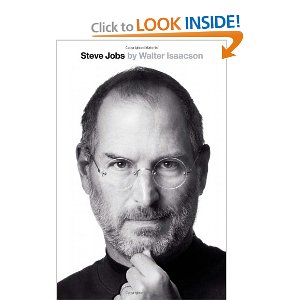Walter Isaacson is one of my favorite biographers. His books about Einstein, Kissinger, and Benjamin Franklin are fantastic. So last summer when I heard that he would be writing a book titled Steve Jobs, I immediately put it into my Amazon cart.
Little did I realize that Jobs would be gone by the time the book was released. A sad loss for his family, for Apple, and for those of us who love the unique Silicon Valley area and culture. Jobs changed the world with his innovation and passion. He brought together great design and great technology as nobody else has ever done.
I never met Steve Jobs but we had many overlapping areas in our lives. We were close in age, we both grew up in Silicon Valley, and we had a few mutual acquaintances. I remember driving past the Next building every day to and from work in the 1980’s. On the day Jobs died it struck me that for my entire life, with the exception of our college years, he and I lived within about 30-miles of each other. Every location mentioned in the biography is familiar to me because of that.

From the book I learned that we had one other significant connection: Steve’s father was a frequent wrecking yard scavenger who took Steve to the junkyards on weekends. Good chance that Steve’s father and my father met; a more distant chance that Steve and I crossed paths as kids. Either way, I guess I can say we sold products to Jobs before he sold anything to us!
One of the great things about this biography is that it doesn’t pull any punches. Steve Jobs was a testy character, hard to work with, and moody. He was definitely from the countercultural world of the 1960’s, experimenting with LSD, Eastern religions, and communal farms. That might be forgiven because of his youth and the era, but he was distant from his best friends, harsh to people who loved him, and neglectful of his children. Shoot, he even parked in the handicap space at the Apple headquarters. The book brings all of this up. I often wondered how his behavior was overlooked by those who revered him.
One of the best parts of the book is the first half about Jobs’ childhood and youth. It emphasizes his being adopted, and later shares the story of him rediscovering his family. It sets the stage for the person Jobs became. The theme of abandonment and “me against the world” was prevalent throughout.
In the second half the book has a tendency to become a profile of Apple’s greatest hits. The decade of the 2000’s saw the redesign of the Macintosh computers, the iPod, the iPhone, the iPad, MobileMe, iCloud, etc etc. Where Isaacson loses me is when he delves into an explanation of all of that. I realize it’s relevant to the story of Steve Jobs, but it’s recent history that is well documented.
This weakness is forgotten when you read the end of the biography. Isaacson develops the storyline of how Jobs changes in the later part of his life. His losing battle to cancer is described with gracious transparency. An insightful (and somehow sad) part of the book is when we read that Steve’s personality changed as he realized his life would be cut short. Excellent writing from Isaacson.
On a sillier note, I’m surprised how often the book mentions the Kona Village Resort. This was Steve’s favorite vacation destination. It’s a wonderful place (D’Aun and I spent our 15th anniversary there). As a former Hawaiian hotel owner, I smiled when I thought about how excited the Kona Village folks must be about this book!
On a more significant note, a strength of the book is the excellent way that Isaacson explains how Jobs lived at the intersection of science and the liberal arts. Or as it is sometimes put, at the place where technology meets the humanities. Jobs himself fully understood this and was proud of it, as could be seen from his famous commencement address at Stanford a few years back.
Isaacson himself spoke at my alma mater (a liberal arts college) and expressed his own passion for the liberal arts education. So it’s wonderful to see how this theme was developed in the book, and I’m thankful that Steve Jobs modeled it so well in his life.
A wonderful book about a fascinating person. And even with a few slow parts, this may be my favorite book of the year.
